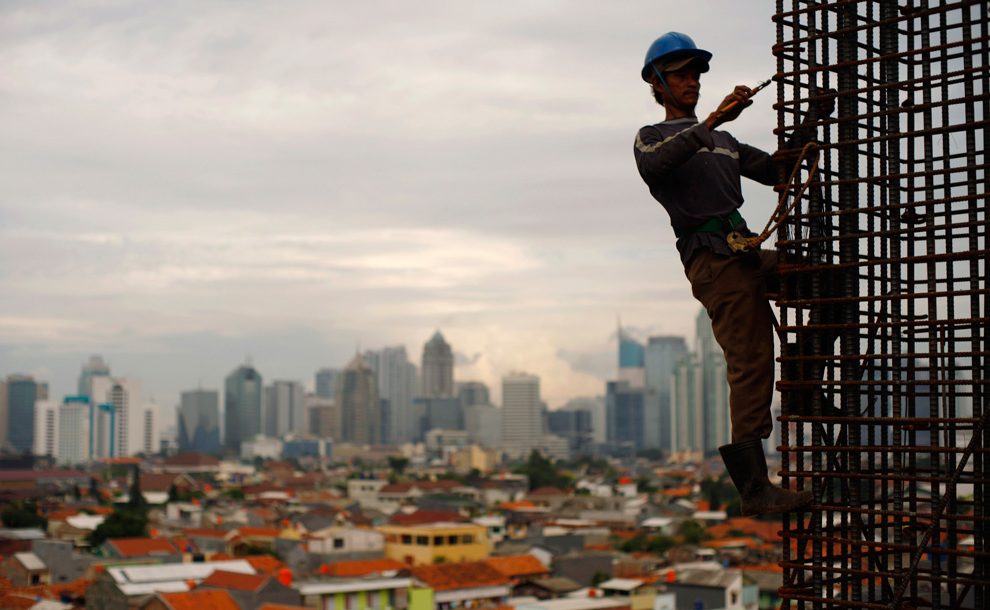Indonesia’s President Joko Widodo is turning state-owned enterprises into ‘strong buffaloes’ to drive his economic development strategy. But, not everyone is happy, not least the country’s private sector. Kyunghoon Kim explains why.
Since the Asian financial crisis, Indonesian governments have regarded state-owned enterprises (SOEs) as ‘cash cows’, an important source of government revenue that required little investment.
Yet, since coming to power in 2014, Indonesia President Joko Widodo (Jokowi) has adopted a markedly different approach, providing robust support to turn SOEs into strong ‘buffalos’ that could help to cultivate the economy. However, the private sector has begun to raise concerns about Jokowi’s economy-wide SOE-led development strategy.
The Indonesian government continues to control a significant part of the economy through SOEs, which are dominant in a range of industries, including natural commodities, utilities, marine and air transportation, banking, and telecommunication. While the SOEs in the manufacturing sector of many developing countries have been privatised or have vanished due to low competitiveness, SOEs in Indonesia continue to manufacture diverse products including glass, paper, fertilisers, cement, steel, airplanes, trains, ships, assault rifles and medicines. SOEs in the construction sector build commercial buildings as well as infrastructure.
In 2014, the government held shares in 150 firms and was a majority shareholder of 126 SOEs. The sector’s assets and revenue were equivalent to 44.2 per cent and 19 per cent of GDP respectively in 2014. Moreover, four out of the six Indonesian companies on the 2016 Forbes Global 2000 list of the world’s largest public companies were SOEs.
From the very beginning, the Jokowi administration put the SOE sector at the centre of the government’s economic development plans and has been energetically providing policy measures to support SOEs or ‘agents of development’. For example, the amount of state capital injection into SOEs expanded significantly in 2015, and it was 43 per cent larger than the entire amount injected in the decade from 2004 to 2014. The share of state capital injection in the government expenditure jumped to 3.6 per cent, which was as high as that during the oil boom under the Suharto government.
At the same time, the Jokowi government is pursuing SOE reform including the formation of sectoral holding companies. But, the aim is different to that of previous administrations, as Jokowi aims to expand the SOE sector rather than make it lean. With strong support from government, the SOE sector’s assets are expected to increase by 40 per cent and its investment by nearly 90 per cent between 2016 and 2019.
Jokowi seems to believe that the cost of delayed infrastructure development and industrialisation is significantly higher than the cost incurred due to inefficiencies in SOE-led projects. The President’s decision to put the SOE sector at the forefront of his economic development strategy comes from the accumulated knowledge on the difficulties that past governments faced in attracting private investment for large projects.
The government is also using SOEs to carry out projects with high level risks, hoping that this will draw private investment in the long term. Moreover, it aims to reduce the rent-seeking behaviour of private contractors who sit on their infrastructure licenses with an aim of reselling them to acquire capital gains.
Jokowi’s SOE-centred development strategy has had some success in terms of initiating headline-grabbing projects that have been stuck at the planning stage for the past decade. Some time will need to pass before drawing conclusions about how successful Jokowi’s SOE-led economic development has been, as many SOE-led projects are long term.
While the private sector welcomes the acceleration of infrastructure development, it is also worried about the expansion of SOEs in various sectors of the economy.
The Indonesian National Shipowners’ Association complained about the government’s decision to assign a SOE, Pelni, to manage more than half of the state-owned shipping routes. The Indonesian Port Operators Association grumbled about the government’s plan to hand over the management rights of hundreds of government-controlled ports to SOEs in a situation where the SOE sector already manages more than half of Indonesia’s ports.
The Indonesian Logistics and Forwarders Association has raised concerns about the government’s airport operator, Angkasa Pura, and port operator, Pelindo, entering the logistics services sector. The Indonesia Chamber of Commerce and Industry and the Indonesian Builders Association have bemoaned the dominance of SOEs in the construction industry and the lack of opportunities for private contractors in major infrastructure projects.
The government has stated that one of the aims behind the establishment of holding companies is to reduce the competition between SOEs that causes market cannibalisation. If the state-owned holding companies are established without developing non-discrimination policies, the playing field could become even more tilted against private businesses as the holding companies are likely to become even more powerful in the market. Moreover, SOE-led manufacturing industries, ranging from cement to steel, are calling for stronger protection against imports and the entry of foreign companies.
The government’s current management approach for the SOE sector indicates that an ambiguous interpretation of Article 33 of the Constitution will continue to be reflected in the revised SOE Law that is expected to be passed in the People’s Representative Council before the end of the Jokowi administration. This law would send mixed signals and further confuse private investors who positively view Jokowi’s business-friendly policies. Future administrations will have to deal with the side effects of waking up the leviathan.
Kyunghoon Kim is a Phd candidate at the Department of International Development, King’s College London, UK. He was previously a research fellow at the Samsung Economic Research Institute, Korea.
 Facebook
Facebook  Twitter
Twitter  Soundcloud
Soundcloud  Youtube
Youtube  Rss
Rss 